Prediction of borderline and obsessive-compulsive personality disorders based on the dimensions of childhood traumas and thematic relationships in conflictual couples
Keywords:
Borderline personality disorder, obsessive-compulsive disorder, trauma, thematic relationships, conflicted couplesAbstract
Aim: The present study was conducted with the aim of predicting borderline and obsessive-compulsive personality disorders based on the dimensions of childhood traumas and thematic relationships in conflictual couples. Method: The research method was descriptive-correlation. Sociostatistics of married men and women referring to counseling centers in 1400 in Tehran. 8 regions of Tehran city were selected using multi-stage cluster sampling method and 15 counseling centers were selected in these regions. Based on the cut-off point of 75 and above in the Milon-3 questionnaire, according to the research entry criteria and according to Klein (2005), 205 participants with borderline personality disorder and 209 participants with obsessive-compulsive personality disorder were selected, and Milon's clinical multi-axis questionnaires 3 (1994), supplemented Bell's (1986) thematic relationships and Bernstein et al.'s (2003) childhood trauma. Data were analyzed using Pearson's correlation coefficient and multivariate regression simultaneously. Results: The results showed that the dimensions of subjective relationships and childhood injuries have a positive and significant relationship with borderline personality disorder and obsessive-compulsive disorder (p<0.01). Also, the results of regression analysis showed that the dimensions of subject relationships and childhood traumas can predict borderline personality disorder and obsessive-compulsive disorder (P<0.01). Conclusion: Therefore, it can be concluded that thematic relationships and traumatic childhood experiences have an effect on the occurrence of borderline and obsessive-compulsive personality disorders in couples. Therefore, it is suggested to pay attention to the role of these variables in counseling sessions and treatment of borderline and obsessive-compulsive personality disorders.
Downloads
Downloads
Published
Issue
Section
License

This work is licensed under a Creative Commons Attribution-NonCommercial 4.0 International License.





















